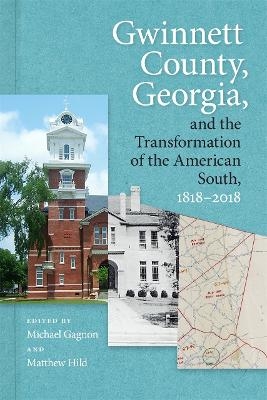
Gwinnett County, Georgia, and the Transformation of the American South, 1818-2018
Seiten
2022
University of Georgia Press (Verlag)
978-0-8203-6209-0 (ISBN)
University of Georgia Press (Verlag)
978-0-8203-6209-0 (ISBN)
Through a compilation of essays written by professional historians with expertise in a diverse array of eras and fields, Michael Gagnon and Matthew Hild’s collection explores Gwinnett County’s history in a systematic way - avoiding the pitfalls of nonprofessional local histories.
In Gwinnett County’s two hundred years, the area has been western, southern, rural, suburban, and now increasingly urban. Its stories include the displacement of Native peoples, white settlement, legal battles over Indian Removal, slavery and cotton, the Civil War and the Lost Cause, New South railroad and town development, Reconstruction and Jim Crow, business development and finance in a national economy, a Populist uprising and Black outmigration, the entrance of women into the political arena, the evolution of cotton culture, the development of modern infrastructure, and the transformation from rural to suburban to a multicultural urbanizing place. Gwinnett, as its chamber of commerce likes to say, has it all.
However, Gwinnett has yet to be the focus of a major historical exploration—until now. Through a compilation of essays written by professional historians with expertise in a diverse array of eras and fields, Michael Gagnon and Matthew Hild’s collection finally tells these stories in a systematic way—avoiding the pitfalls of nonprofessional local histories that tend to ignore issues of race, class, or gender. While not claiming to be comprehensive, this book provides general readers and scholars alike with a glimpse at Gwinnett through the ages.
CONTRIBUTORS: Julia Brock, William D. Bryan, Richard A. Cook Jr., Lisa L. Crutchfield, Michael Gagnon, Edward Hatfield, Keith S. Hébert, Matthew Hild, R. Scott Huffard Jr., David L. Mason, Marko Maunula, Erica Metcalfe, Katheryn L. Nikolich, David B. Parker, Bradley R. Rice, and Carey Olmstead Shellman
In Gwinnett County’s two hundred years, the area has been western, southern, rural, suburban, and now increasingly urban. Its stories include the displacement of Native peoples, white settlement, legal battles over Indian Removal, slavery and cotton, the Civil War and the Lost Cause, New South railroad and town development, Reconstruction and Jim Crow, business development and finance in a national economy, a Populist uprising and Black outmigration, the entrance of women into the political arena, the evolution of cotton culture, the development of modern infrastructure, and the transformation from rural to suburban to a multicultural urbanizing place. Gwinnett, as its chamber of commerce likes to say, has it all.
However, Gwinnett has yet to be the focus of a major historical exploration—until now. Through a compilation of essays written by professional historians with expertise in a diverse array of eras and fields, Michael Gagnon and Matthew Hild’s collection finally tells these stories in a systematic way—avoiding the pitfalls of nonprofessional local histories that tend to ignore issues of race, class, or gender. While not claiming to be comprehensive, this book provides general readers and scholars alike with a glimpse at Gwinnett through the ages.
CONTRIBUTORS: Julia Brock, William D. Bryan, Richard A. Cook Jr., Lisa L. Crutchfield, Michael Gagnon, Edward Hatfield, Keith S. Hébert, Matthew Hild, R. Scott Huffard Jr., David L. Mason, Marko Maunula, Erica Metcalfe, Katheryn L. Nikolich, David B. Parker, Bradley R. Rice, and Carey Olmstead Shellman
William D. Bryan is an environmental historian in Atlanta, Georgia. Keith Hebert is an associate professor and public history program officer at Auburn University. He is the author of The Long Civil War in the North Georgia Mountains: Confederate Nationalism, Sectionalism, and White Supremacy in Bartow County, Georgia and Cornerstone of the Confederacy: Alexander H. Stephens and the Speech That Defined the Lost Cause. Marko Maunula is an assistant professor of history at Clayton State University. David B. Parker is a professor of history at Kennesaw State University. He is the author of Alias Bill Arp: Charles Henry Smith and the South's "Goodly Heritage".
| Erscheinungsdatum | 13.06.2022 |
|---|---|
| Verlagsort | Georgia |
| Sprache | englisch |
| Maße | 152 x 229 mm |
| Gewicht | 130 g |
| Themenwelt | Sachbuch/Ratgeber ► Geschichte / Politik ► Allgemeines / Lexika |
| Geisteswissenschaften ► Geschichte ► Allgemeine Geschichte | |
| Geisteswissenschaften ► Geschichte ► Regional- / Ländergeschichte | |
| Sozialwissenschaften ► Soziologie | |
| ISBN-10 | 0-8203-6209-3 / 0820362093 |
| ISBN-13 | 978-0-8203-6209-0 / 9780820362090 |
| Zustand | Neuware |
| Haben Sie eine Frage zum Produkt? |
Mehr entdecken
aus dem Bereich
aus dem Bereich
die Reise der Menschheit : zwischen Aufbruch und Scheitern
Buch | Softcover (2023)
Ullstein Taschenbuch Verlag
CHF 20,95


